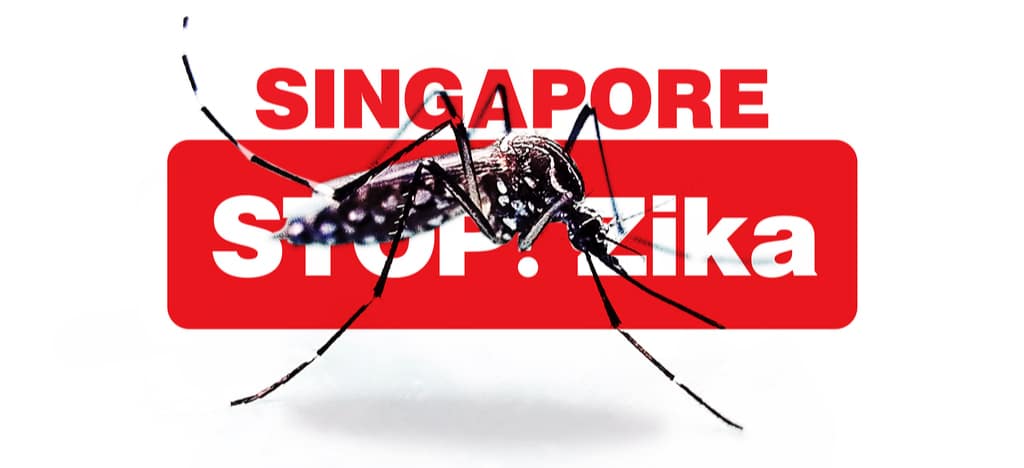What is Zika?
The Zika virus is a virus that can infect humans and cause disease through the bite of a mosquito carrying the virus. Similar to the Dengue virus, it is carried by the Aedes mosquito which is found in wide areas along the equator and subtropics. Unlike Dengue, Zika usually causes no or mild symptoms with no serious complications. However, Zika made headlines all over the world between 2015 and 2016 when more than 4000 Brazilian infants were born with abnormally small heads, known as microcephaly. This was found to be related to maternal Zika infection in pregnancy. In February 2016, the World Health Organization (WHO) declared neurological complications linked to Zika a public health emergency. There is currently no vaccine or anti-viral drug to treat Zika.
There was a Zika scare in Singapore – what’s the latest?
Singapore’s first Zika outbreak occurred in August 2016 with a total of 455 cases reported across 3 months. Through enhanced surveillance and intensive mosquito control – systems already in place to manage the ongoing problem of Dengue – authorities acted swiftly in identifying infected people, eradicating mosquitoes and removing breeding sites. New cases were reduced by 48 percent within a month. Crucially, Singapore researchers had also confirmed that the local Zika strain was not the same as the Brazilian Zika strain. The local strain was traced to one that has been circulating in South-East Asia since the 1960s, and Zika strains identified prior to 2013 have not been linked to severe neurological complications. No babies with microcephaly were born to pregnant women diagnosed with Zika in Singapore in 2016. The numbers of Zika infections in Singapore continued to decline, with 67 cases reported in 2017 and just 1 in all of 2018 however there have been 3 cases announced in September 2019 around Serangoon area.
Is there Zika present in surrounding countries?
Yes, the Zika virus has been circulating in Asia longer than in the Americas. 3 confirmed cases of congenital Zika virus infection with microcephaly were recently reported in Asia – 2 in Thailand and 1 in Vietnam. It is not known if these cases were caused by an Asian strain or an imported American strain. In countries lacking resources for robust disease surveillance, there are gaps in data on actual numbers and the impact of disease in the region.
How is Zika spread?
The virus is transmitted to humans by the bite of an infective Aedes mosquito. The virus can be passed from a pregnant woman to her foetus. Sexual transmission has also been reported.
I’m living in Singapore and pregnant/planning for a baby. What do I and my partner need to know?
There are many unanswered questions about how Zika causes congenital infections and birth defects. Even though the threat of Zika in Singapore appears largely contained, the risk is still present in the region. The most important thing is to prevent Zika infection through mosquito avoidance, in Singapore as well as when traveling in the region. Use insect repellant (link to article on insect repellants safe in pregnancy), cover your skin and mosquito-proof your home (link to article on mosquito prevention).
Pregnant women with symptoms of Zika, or whose sexual partners test positive for Zika should consult their Family Doctor or Obstetrician as soon as possible. The guidelines do not recommend routine testing for Zika in pregnant women without symptoms.
If you and your partner are planning to get pregnant and either of you have tested positive for Zika, there are guidelines on how long you should wait before trying to conceive, and using condoms to prevent sexual transmission (2 months for women, 3 months for men).
Decisions about pregnancy planning are personal and complex, and Zika tests can be difficult to interpret. Women and their partners are encouraged to see their GPs to discuss pregnancy planning and their concerns.
Is it just pregnant women who should be concerned? What about children?
To date, the major concern is Zika’s association with microcephaly and other birth defects from infection in-utero. Most children who contract Zika after birth have no symptoms or have only mild illness, similar to adults with Zika.
What are the symptoms of Zika? Should I get tested?
Only 1 out of 5 infected individuals have symptoms, such as:
- Fever
- Rash
- Joint Pain
- Muscle Pain
- Headache
- Conjunctivitis
Symptoms usually appear within 3 to 12 days of being bitten by an infected mosquito, and can last between 4 to 7 days.
Authorities recommend testing only if you have symptoms of Zika, or if you are pregnant and your partner has tested positive for Zika. The Zika test can be done at IMC after consultation with any of our Family Doctors.
Further reading/useful links
https://www.moh.gov.sg/diseases-updates/zika
For the more scientifically-geared:
https://research.a-star.edu.sg/feature-and-innovation/7740/how-zika-upped-the-ante
 Dr June is a Singapore-trained doctor based at IMC Camden. Born and bred in Singapore, she has a keen interest in local disease patterns and greatly dislikes mosquitoes. Call 6733 4440 to make an appointment.
Dr June is a Singapore-trained doctor based at IMC Camden. Born and bred in Singapore, she has a keen interest in local disease patterns and greatly dislikes mosquitoes. Call 6733 4440 to make an appointment.


































